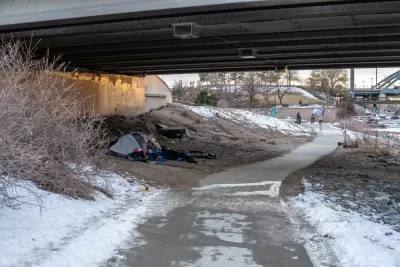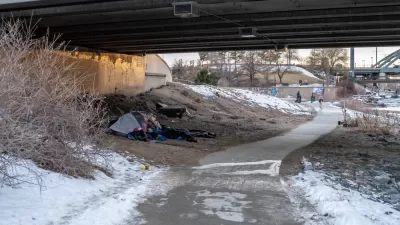Denver's "Right to Survive" initiative highlights just how troubling and problematic policy approaches to homelessness can be.

J. Brian Charles reports: "On Tuesday, Denver voters were the first in the country to weigh in on whether homeless people should have what supporters say is the "right to survive." They responded with an overwhelmingly no."
Ballot Initiative 300 would have ended a citywide ban on camping and wearing a blanket, "effectively criminalizing homeless people who live in tents and on the streets," according to Charles.
According to Charles, Initiative 300 was a result of the September 2018 ruling in the 9th Circuit U.S. Court of Appeals overturning a Boise law that banned sleeping in public spaces as "cruel and unusual punishment."
The "right to survive" initiative failed to win support from some homeless advocates as well as the city agency working to reduce homelessness in the city. "Its director, Chris Conner, argued that eliminating the ban would cut some homeless people off from services they need. Under the ban, police are required to connect homeless people they encounter with social services. They only issue a ticket or make an arrest if the person refuses services or refuses to move," explains Charles.
"But Denver Homeless Out Loud, which gathered the signatures to put Initiative 300 on the ballot, objected to the idea that the ban reduces homelessness. It merely moves homeless people out of sight and out of mind."
FULL STORY: Denver Voters Deny Homeless the 'Right to Survive.' Here's What That Means.

Planetizen Federal Action Tracker
A weekly monitor of how Trump’s orders and actions are impacting planners and planning in America.

San Francisco's School District Spent $105M To Build Affordable Housing for Teachers — And That's Just the Beginning
SFUSD joins a growing list of school districts using their land holdings to address housing affordability challenges faced by their own employees.

The Tiny, Adorable $7,000 Car Turning Japan Onto EVs
The single seat Mibot charges from a regular plug as quickly as an iPad, and is about half the price of an average EV.

Atlanta Bus System Redesign Will Nearly Triple Access
MARTA's Next Gen Bus Network will retool over 100 bus routes, expand frequent service.

Toronto Condo Sales Drop 75%
In two of Canada’s most expensive cities, more condos were built than ever — and sales are plummeting.

Vehicle-related Deaths Drop 29% in Richmond, VA
The seventh year of the city's Vision Zero strategy also cut the number of people killed in alcohol-related crashes by half.
Urban Design for Planners 1: Software Tools
This six-course series explores essential urban design concepts using open source software and equips planners with the tools they need to participate fully in the urban design process.
Planning for Universal Design
Learn the tools for implementing Universal Design in planning regulations.
Smith Gee Studio
City of Charlotte
City of Camden Redevelopment Agency
City of Astoria
Transportation Research & Education Center (TREC) at Portland State University
US High Speed Rail Association
City of Camden Redevelopment Agency
Municipality of Princeton (NJ)





























